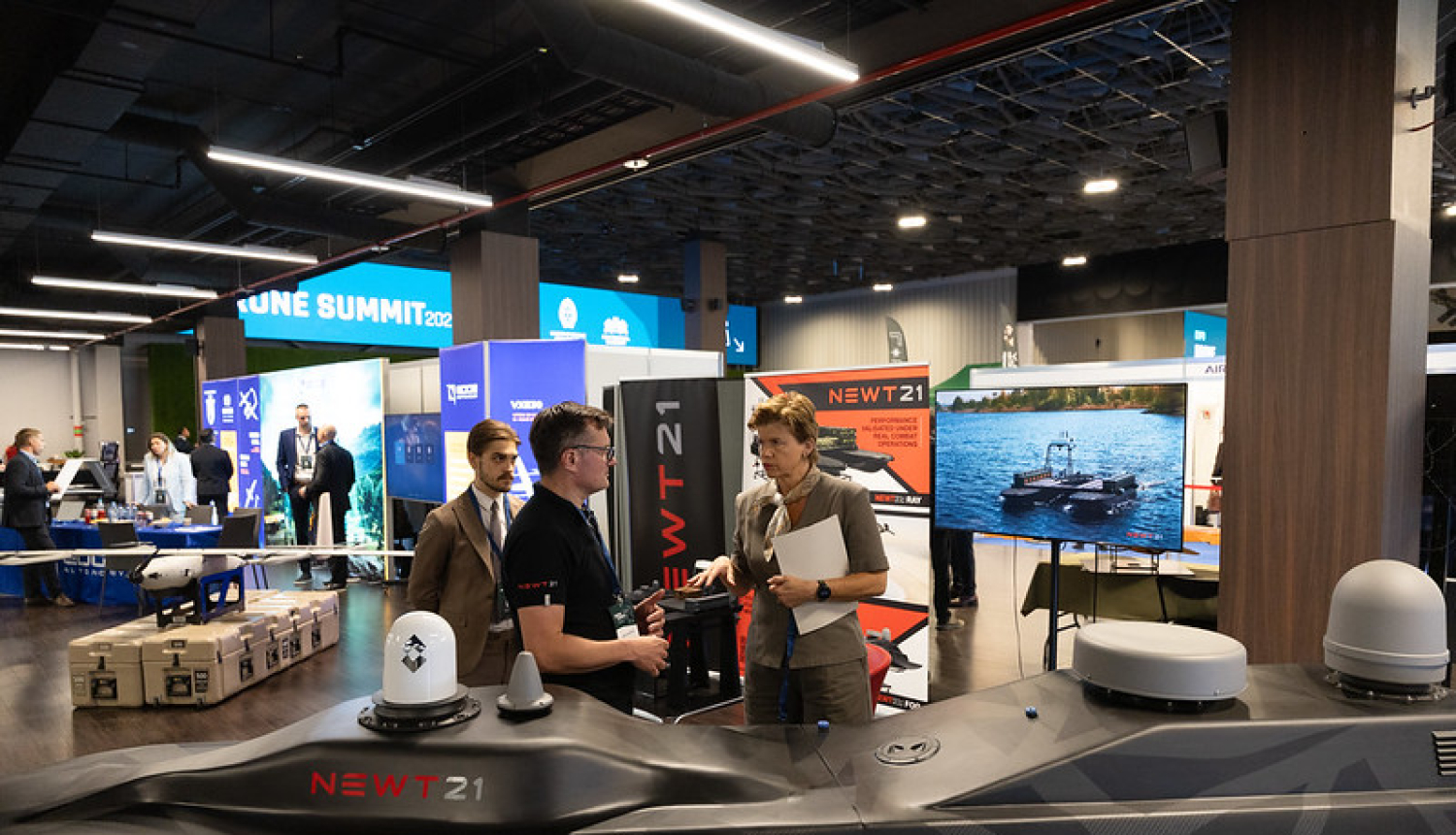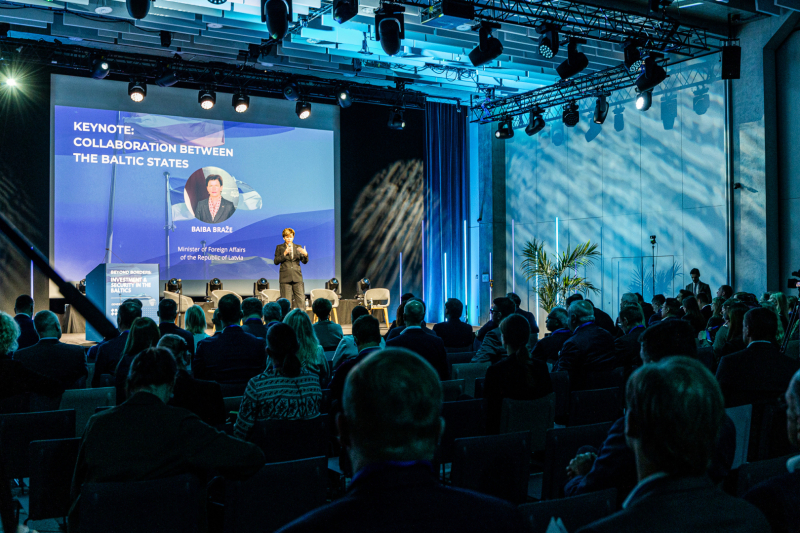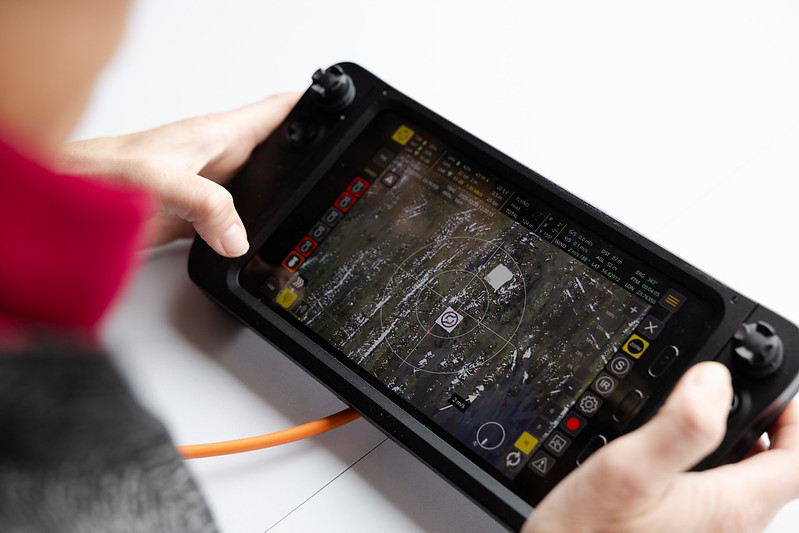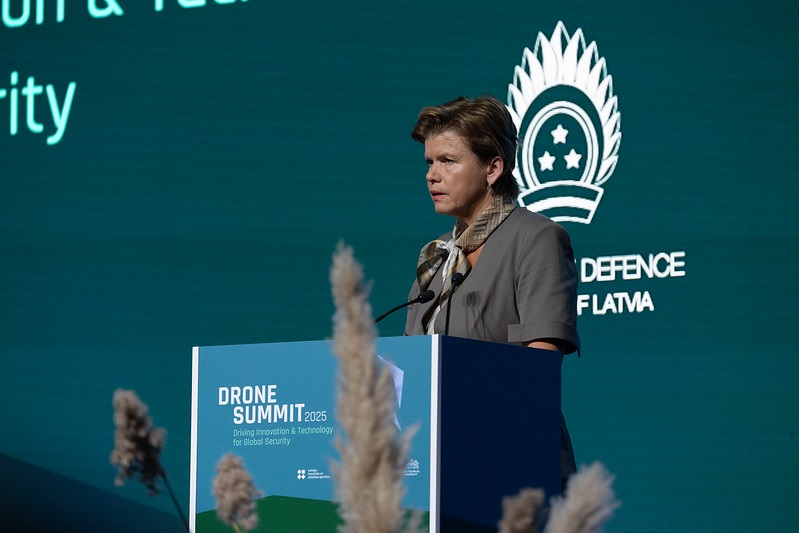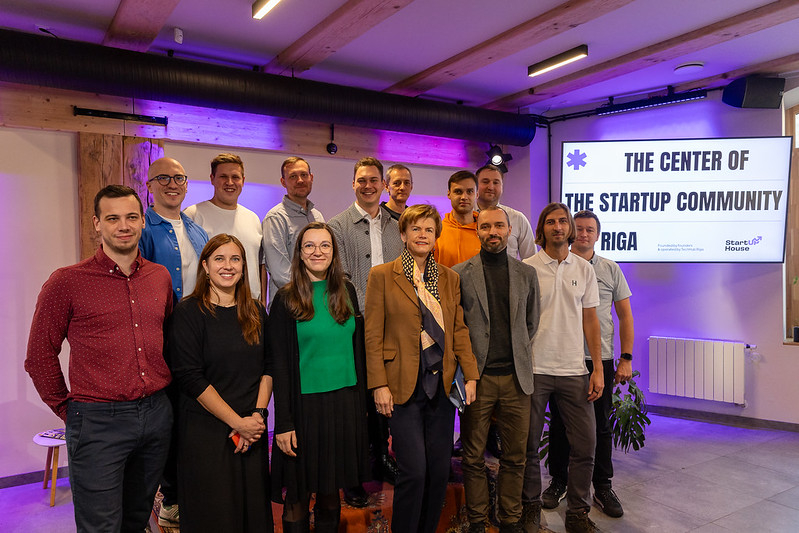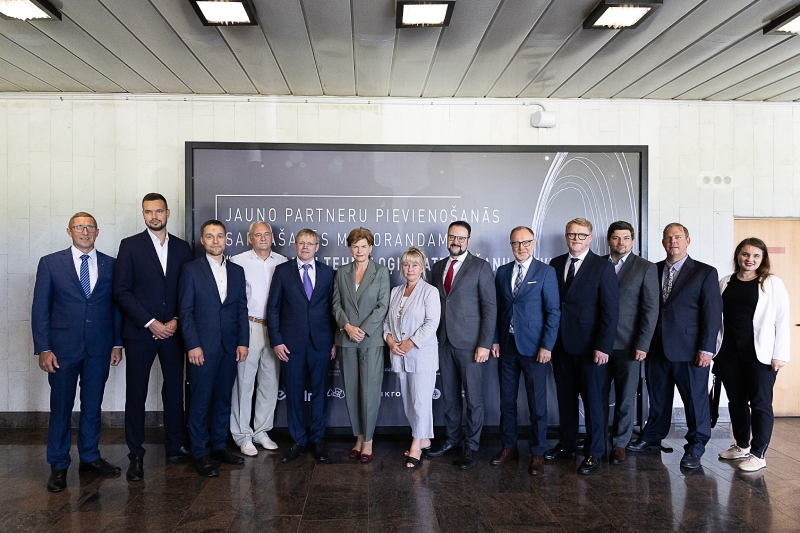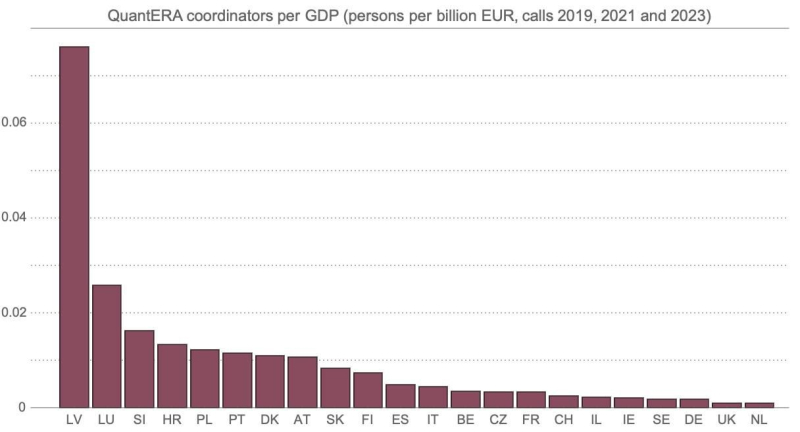“I hold Latvian entrepreneurs and their accomplishments in the highest regard. Latvia’s achievements in innovation, information and communication technologies, quantum technologies, and other emerging tech fields are recognised internationally. One of the privileges of my role as minister is regularly meeting our entrepreneurs, scientists, and researchers to learn more about their work and successes, and to test their innovations first-hand.
During the outgoing and incoming working visits, as well as at international conferences and forums, I frequently meet with foreign officials, companies, investors, representatives of various institutions and members of the academic community – to discuss economic cooperation. Time and again, I have received positive feedback and high praise for the achievements of Latvian businesses, indicating strong interest in forging new partnerships.
It is only natural that the geopolitical situation has driven growth in our domestic defence industry, particularly in UAV technologies. Latvia offers excellent conditions for testing and experimentation with emerging technologies – increasingly, manufacturers from allied countries arrive in Latvia to test the latest generations of drones. We have also made significant strides in quantum technologies – Latvia is a “small quantum superpower”, as up to 20% of the world’s quantum algorithms are based on those developed by our researchers.
The recognition of what our companies have achieved is also reflected in investor assessments – the investment climate in Latvia has significantly improved, and half of the current investors intend to continue investing here. Last year, Latvia was the most successful of the Baltic states in attracting investment. I encourage everyone to explore the annual “European Attractiveness Survey 2025” by EY, as well as the latest study by the Foreign Investors’ Council in Latvia (FICIL) on the investment environment across all three Baltic countries (“FICIL Sentiment Index”). The surveyed investors have also pointed out that the Baltic states underestimate themselves and are too modest about their tangible achievements. I share this view: we must take greater pride in our success and change our mindset. This matters not only to investors, but also to us as a nation,” Foreign Minister Baiba Braže urges.
She also notes:
“The Foreign Service will continue to use the tools at its disposal to represent Latvia’s economic interests. Supporting businesses in boosting their visibility, accessing foreign markets, and attracting international investors and partners remains a top priority for the diplomatic service. We are already seeing concrete results – export growth is notably stronger in non-EU countries where Latvia has embassies. Meanwhile, here at home in Latvia, we have all the necessary instruments to support foreign investors. It is essential that we continue – through close cooperation between the public sector, private businesses, and academia – to have less talk and less doubt, and more action.
The investment climate in Latvia has significantly improved, despite current geopolitical uncertainties and other challenges
According to the recently published EY European Attractiveness Survey 2025, which analyses new foreign investment activity and investor sentiment across Europe, Latvia was the most successful of the Baltic states in attracting investment last year. In 2024, Latvia launched 33 new foreign investment projects – a 50% increase compared to 2023, which saw 22 new projects. Latvia was also the only Baltic state to experience growth both in the number of new foreign investment projects and the jobs created by them. These new projects created 1,937 jobs in 2024 – a 53% increase from the 1,265 jobs generated in 2023. With respect to new projects and job creation, these are Latvia’s best results in the last three years.[1] According to Guntars Krols, EY’s Partner for the Baltic states: “Last year’s relatively strong performance is encouraging, proving that Latvia can attract foreign investment despite the economic downturn and investor concerns about geopolitical stability across the region.”[2]
Meanwhile, the latest FICIL Sentiment Index[3] – the first-ever study by the Foreign Investors’ Council in Latvia (FICIL) to assess the investment environment across all the three Baltic states – concludes that Latvia’s investment attractiveness has risen significantly compared to the previous year, from a low 1.9 to a moderate 3 on a five-point scale. FICIL’s public statement notes that the investment climate in Latvia has improved considerably, with many foreign investors providing positive feedback, particularly acknowledging the Latvian government’s efforts to strengthen security and defence and ensure stability despite ongoing geopolitical uncertainties and other challenges.[4] According to the same study, in the final quarter of 2024, Latvia’s stock of foreign direct investment reached €26.3 billion, an increase by €5.1 billion compared to the final quarter of 2021. Overall, the stock of foreign investment in Latvia rose by 5.6%, or €1.4 billion, over the past year. Notably, about 50% of existing investors interviewed also plan to increase their investments in Latvia in 2025.”
Investors Say: Latvia Is Too Modest About Its Achievements
At the same time, when assessing the investment climate in the Baltic states, foreign investors have noted that Latvia suffers from negative self-perception and excessive self-criticism, and that there should be greater pride in the country’s accomplishments. The FICIL Sentiment Index study (pp. 10–11)[5] highlights the following about Latvia: “The most frequent comment regarding the investment climate of Latvia was about the great untapped potential of the country and its solid business environment: good infrastructure, a strong pool of engineers and tech talent, and a democratic environment that allows open public debate. However, many investors admit that the country suffers from negative self-perception and self-criticism [..]. In light of this, many interviewees encouraged being more objective and vocal about Latvia’s achievements. In addition, foreign investors suggested a shift in mindset – from dwelling on the past (historical challenges and difficulties) towards embracing and building a desirable vision of the future. [..]”
Overall, the analysis of the Baltic states (pp. 76–77)[6] reveals that they are often too modest about their achievements: “Growth requires a shared belief that it’s possible. Beyond numbers, investment is psychological. The collective belief that the country is moving forward is critical for talent retention and investment attraction. This ‘social mood’ influences whether people choose to stay, return, or invest. Too often, the Baltics undersell themselves. Latvia’s leadership in digital public services, Lithuania’s thriving fintech sector, and Estonia’s e-governance success are recognised abroad but rarely celebrated at home. As one investor noted, ‘the Baltics are too modest for their own good.’ This mindset must shift. National narratives must promote opportunity, future readiness and pride in local capacity, especially among the youth and diaspora. The Sentiment Index shows that investors care about how countries sell themselves to their own people. Making growth visible – through digital transformation, defence sector opportunities, or science-based innovation hubs – is part of creating a self-sustaining development story.”
In the context of investment attractiveness, it is worth noting that Riga has, for the third consecutive year, been included in the Financial Times list of Europe’s top investment destinations. The Latvian capital received two awards in the European Cities and Regions of the Future 2025 ranking.[7]
Baltic Allies Praised for Defence Investments and Regional Security Leadership
During all recent working visits, including the joint visit of the Baltic Foreign Ministers to the United States, Latvia and its neighbours received high praise for their responsible approach and significant investments in strengthening defence and security capabilities. The Baltic states’ efforts to enhance energy independence and security have also been widely acknowledged. In meetings with investors, foreign politicians, and business leaders, Latvia’s status as a member of the EU, NATO, and OECD has been repeatedly emphasised as a key advantage. Latvia’s support for Ukraine – which has been one of the largest (relative to GDP) since the first day of the war – has also been highly valued as a contribution to broader regional security.
FICIL also highlighted three areas where the Baltic states, including Latvia, have demonstrated significant resilience and progress[8]: (1) Energy independence, especially the disconnection from the BRELL grid and synchronisation with the continental European power network. (2) Leadership in e-governance and fintech across the region. (3) Defence industry development, including Latvia’s full-cycle production of Patria military vehicles – strengthening both national security and the high-tech industrial base[9]. A quote from an Estonian investor, included on p. 53[10] of the FICIL study, reads: “There are already some examples we can build on. In Latvia, for instance, we have the Patria military vehicle project. This kind of initiative could be a stepping stone for more joint Baltic projects, particularly in R&D and advanced technologies.”
In a recent meeting between Foreign Minister Baiba Braže and U.S. Secretary of Defence Pete Hegseth during her working visit to Singapore, the Baltic states’ commitment to defence capacity building and strengthening NATO’s collective security was strongly commended – particularly in light of their progress toward allocating 5% of GDP to defence. At the Shangri-La Dialogue security forum, Secretary Hegseth called the Baltic states “model allies”.[11] Meanwhile, U.S. Secretary of State Marco Rubio, in his meeting with the Baltic foreign ministers, referred to the Baltic states as “the perfect allies”, praising their investment in defence and security as a direct contribution to NATO’s collective strength.[12]
Achievements in Drone Technologies: Securing International Funding, Investment, and Innovation
Investor confidence is high regarding Latvia’s achievements in the development of its domestic defence industry, including drone technologies, as evidenced by investments made in Latvian drone companies such as Edge Autonomy and Origin Robotics.
Latvia has initiated and, alongside the United Kingdom, leads the international Drone Coalition, which currently includes 18 countries, with numerous others expressing an interest in joining. The Drone Coalition has not only strengthened national defence capabilities but also created new opportunities for local entrepreneurs, researchers, and the military industry as a whole. Increasingly, manufacturers from across Europe who are part of the Drone Coalition are coming to Latvia to test the latest generation of drones.[13] Marking the first anniversary of the coalition’s founding in February 2025, leaders of Latvia’s drone associations noted: “The Drone Coalition has encouraged the development and innovation of this technology not only in Latvia but throughout Europe. Latvian drone manufacturers are the leaders in the Baltics, and it is essential to maintain this position.”[14]
When discussing Latvia’s achievements in drone technology, it is important to highlight both the insights of Latvian start-ups and the opinions of foreign entrepreneurs and media. For example, on 15 May 2025, the Franco-German TV channel ARTE aired a story highlighting Latvia’s success in the drone industry: “Latvia at the Cutting Edge of Military Drones.”[15] It was noted in the announcement: “(…) While Ukraine sees itself as a world leader in the production of military drones, the current battles have allowed Latvia to become an example in terms of production and innovation in this field.”
At the “Drone Summit 2025” held in Riga on 28 May, Miel van den Brekel, a representative of the Dutch company Avalor AI, stated that Latvian players in the drone industry had made a strong impression: “We see promising opportunities for cooperation, both in technology and in its practical application. Events like this are especially valuable for us as representatives of the Dutch ecosystem, as it is rare to encounter such a broad representation of the sector in everyday circumstances. This kind of international platform inspires and lays the foundation for real joint projects with Latvia and other countries. Latvia’s particular strength lies in its expansive and flexible technology testing capabilities.”[16]
The AIN online platform, dedicated to the fast-growing Central and Eastern European technology ecosystem and covering the latest news on start-ups, venture capital, and M&A activity in the region – especially in Ukraine – published an interview with Agris Ķipurs, CEO and co-founder of Origin Robotics, titled “Startup of the Day: How Origin, a Latvian defence tech startup, works”. In the interview, Agris Ķipurs said[17]: “That’s where Origin comes in. We’re here to provide a better solution: affordable, precision-guided weapon systems that can give smaller nation-states real military strength, not just parade-ready displays. The reality is that many European countries can’t afford enough traditional precision weapons to truly defend themselves. For countries like Latvia, having budget-friendly precision-strike capabilities isn’t just a luxury. It’s a necessity. We need to be able to defend ourselves effectively, not just show off military gear on Independence Day. Our goal is to level the playing field, giving nations with smaller defence budgets the tools they need to deter threats and stay secure.” Agris Ķipurs has been involved in drone manufacturing since 2013[18]. He was one of the founders of the AirDog drone manufacturer, which was acquired in 2020 by Alarm.com, a U.S. technology company.[19]
Alongside the FICIL research, the German-Baltic Chamber of Commerce has also carried out its annual AHK Business Survey 2025 – Business Climate Survey in Central-Eastern Europe (CEE)[20]. In the conclusions, the drone industry is mentioned as one of the potential areas for adapting business models to the new situation, noting that excellent work has been done in the Baltic States in this field so far.
Examples of Achievements in Drone Technology Development in Latvia:
- Origin Robotics, a Latvian military tech company[21], produces unmanned aerial vehicles (UAVs) with combat capabilities that can neutralise targets and provide defence even in electronic warfare conditions. With support from the Ministry of Foreign Affairs, the company secured €4.5 million from the European Defence Fund to develop a portable ISTAR (intelligence, surveillance, target acquisition, and reconnaissance) UAV with laser target designation. The company also received €4 million in pre-seed funding[22] (€2.4 million from Change Ventures and Silicon Roundabout Ventures, and €1.6 million in grants from the EU and the Latvian Ministry of Defence). Recently, Origin Robotics delivered its BEAK drone systems to the Netherlands, offering new capabilities for European allies. The partnership with BSS Holland BV marks a key step in integrating Latvian technologies into Europe’s defence infrastructure.
- Edge Autonomy, headquartered in the USA with manufacturing and flight operations centres in both Latvia and the USA, is a global leader in unmanned systems technology. The company provides innovative solutions to government, commercial, and academic clients in nearly 80 countries. It works closely with the Latvian Armed Forces, and its drones are also used in support of Ukraine. In 2023, Edge Autonomy Riga reached record-high financial results, with turnover increasing to €79.99 million – 3.8 times more than the previous year – and profits rising 6.5 times to €29.02 million[23]. In March 2025, U.S. space infrastructure company Redwire announced[24] it would acquire Edge Autonomy, whose Latvian entity Edge Autonomy Riga is part of the group. The reported deal value is $925 million – $150 million in cash and $775 million in Redwire shares. The company was originally established in Latvia as UAV Factory. In 2019, it received the Baltic Innovation Award, and in 2021, its Penguin C Mk 2 VTOL UAV received the Latvian-American Innovation Award. Redwire aims to combine its expertise in low Earth orbit satellites with Edge Autonomy’s advanced drone tech to develop integrated command and control networks for military applications.
- SPH Engineering, a Latvian company, develops UAV control software and integrated systems with various industrial sensors[25]. It has clients in over 200 countries, with most in the United States, as well as across Europe, Asia, the Middle East, and Africa.
- VIC TEC, over the past year, has gained recognition for its innovative development and production of unmanned surface vessels (USVs). In partnership with Swiss company Tecpro, it developed the VIDAR FP USV, presented at Eurosatory 2024. The company collaborates with international partners such as Leonardo, Atlas Aerospace, and Anytec, strengthening Latvia’s position in the global defence and unmanned technology market[26].
- Submerge Baltic, a Latvian start-up, has introduced the PIKE line of autonomous underwater drones, capable of operating up to 150 km and at depths of 500 metres for up to seven days.[27] The company is working with international partners and plans joint tests with the Latvian Navy and Ukraine.
- LV-Teh, in cooperation with Ukrainian military engineers and sappers, is developing a demining robot with both remote and autonomous operation capabilities.[28] The device is intended for neutralising all types of explosive devices and munitions.
- LMT is developing drone technologies for air surveillance using balloon-based platforms.
- In cooperation with the National Armed Forces, LMT has established Europe’s first 5G military testing range[29].
- Under LMT’s leadership and with support from the Ministry of Defence, Latvia is participating in two NATO 5G research projects[30]: NIAG’s “5th Generation International Mobile Telecommunications for NATO Operations” and NATO STO’s “5G Technologies Application to NATO Operations”. Latvia is also involved in the European Defence Fund’s iMUGS project, which develops integrated modular unmanned ground systems, including 5G testing related to the autonomy of military platforms like tanks and drones.
- Latvian start-up Natrix has developed a remotely operated platform for combat zone tasks, primarily for delivering ammunition, equipment, and food, as well as evacuating wounded soldiers.[31]
- Latvian company Belss has entered the field of military drone development and production through its new venture Eraser[32], with a focus on R&D and innovation.
- NEWT21 designs and manufactures marine drones using carbon fibre technology. It has thus far produced two autonomous marine drones, FOG and RAY[33], capable of operating in various conditions, including resistance to electromagnetic jamming.
- Frankenburg Technologies will begin producing short-range surface-to-air missiles in Latvia to strengthen defence capabilities[34]. The Estonian company has signed an R&D agreement with the Latvian Ministry of Defence, opening up collaboration opportunities with the Latvian National Armed Forces. The company specialises in air defence systems and missile technologies, with a particular focus on countering unmanned aerial threats, including Russia’s Shahed drones.
Overall, the achievements of Latvian companies in innovation and competitiveness are also demonstrated by other enterprises that export high value-added technologies. Here are a few examples:
- LMT – connectivity solutions;
- Light Guide Optics – innovative fibre and laser technologies;
- Exonicus – virtual and augmented reality medical training simulators for battlefield trauma care;
- Entangle – provides quantum-secure encryption for connecting critical infrastructure and industrial Internet of Things via public mobile networks.
A number of Latvian companies have achieved international success, concluded significant international contracts, and attracted foreign funding. There is also growing interest from foreign companies in cooperating with Latvian enterprises. Latvia’s achievements in the field of innovation have received international recognition across several sectors:
- The Latvian digital health start-up Longenesis won first place and a $100,000 prize at the world’s largest international start-up competition, Expand North Star 2024 (Dubai).[35]
- The joint project “Seamless 5G Connectivity in the Baltic Sea” by LMT and LVR Flote received the Sustainability Award in the “Digitalisation” category from the International Association of Ports and Harbours (IAPH).[36]
- The student-founded company Neamo from Riga Technical University was awarded Best Solution in the EIT Food category at the final of the EIT Jumpstarter pre-acceleration programme run by the European Institute of Innovation and Technology. Neamo uses data from Copernicus Sentinel satellites to monitor environmental factors critical to predicting disease outbreaks.[37] Neamo also won the Latvian final of the 7th EU CASSINI Space Hackathon.[38]
- On 3 June 2025, Aerones, a global leader in robotic wind turbine inspection, maintenance, and AI-powered efficiency solutions, announced it had raised $62 million to accelerate its global expansion and technological development. The round was led by existing investors Activate Capital and S2G Investments, with participation from Carbon Equity and Overlap Holdings.[39] Furthermore, its subsidiary, Aerones Engineering, received a €4.4 million grant from the EU Innovation Fund, dedicated to highly innovative, scalable, and ambitious infrastructure projects aimed at reducing CO₂ emissions.[40]
In April, the European Commission announced that nine R&D projects from Latvia had passed the European Defence Fund co-financing competition. These involved four companies and two research institutions, securing approximately €7 million in co-funding[41]. The projects include two Latvian-led technology development proposals: - “READYMED EUROPE” – for the development of a medical training simulator (led by Latvian company Exonicus R&D); - “VANTAGE” – for the development of an improved prototype of a small-class unmanned aerial system (led by LMT).
Latvian company Ascent Lumina has also been accepted into the European Commission’s Defence Innovation Accelerator[42], a business accelerator aimed at strengthening the European defence sector by supporting innovative start-ups from EU Member States and Norway – further proof of the high regard for Latvian-made technological solutions internationally.
Comprehensive information on innovation and technology developments can also be found at labsoflatvia.com[43].
Latvia – “The Small Quantum Superpower”
Latvia is also internationally recognised for its achievements in quantum technology across all three key domains: (1) Quantum algorithms, (2) Quantum sensors and (3) Quantum communication. University of Latvia tenured professor Andris Ambainis is one of the world’s leading scientists in the field of quantum algorithm development. Algorithms developed by Professor Ambainis and Associate Professor Aleksandrs Belovs form the basis for up to 20% of all quantum algorithms globally.[44] Quantum sensors developed by Professor Mārcis Auziņš are in demand across European and transatlantic projects. In the field of quantum communications, key contributions to building Latvia’s national quantum communication network have come from: Professor Jurģis Poriņš (Riga Technical University); Associate Professor Leo Trukšāns (University of Latvia and Chief Quantum Encryption Engineer at the Latvian State Radio and Television Centre); Scientists at the Institute of Mathematics and Computer Science (University of Latvia), as well as the company TET. Latvia is the first Baltic state to establish a national quantum-secure communication network. Tenured professor Vjačeslavs Kaščejevs from the University of Latvia has also earned international acclaim in the field of quantum nanoelectronics.[45]
At the QuantERA Strategic Conference in Amsterdam in 2024, Latvia ranked first in Europe in terms of the number of QuantERA project coordinators per capita (GDP-based), with three represented projects.[46] This ranking was based on data submitted by Latvia covering the period since 2019.
Slide from the QuantERA conference in Amsterdam in 2024[47]
In 2024, the Institute of Solid State Physics at the University of Latvia began work on the European project “Towards a Centre of Excellence in Quantum Photonics in Latvia”. The project involves collaboration between the University of Latvia, Riga Technical University, University of Trento (Italy), and University of Technology of Troyes (France).
At the beginning of 2026, Latvia is set to host the internationally significant Annual Quantum Information Processing Conference (QIP2026). The University of Latvia earned the right to organise this event through a global open competition.
It is also worth noting that the first students in Latvia have now completed newly introduced study modules dedicated to quantum technologies – both at the University of Latvia and Riga Technical University.
[1] EY study: 50% more new foreign investment projects in Latvia at the beginning of last year than in 2023
[2] EY study: 50% more new foreign investment projects in Latvia at the beginning of last year than in 2023
[3] FICIL-Sentiment-Index-report_2024-1.pdf
[4] Significant improvement of the investment climate in Latvia – sentiment of the foreign investors
[5] FICIL-Sentiment-Index-report_2024-1.pdf (pp 10-11)
[6] FICIL-Sentiment-Index-report_2024-1.pdf (76.-77.lpp.)
[7] Riga named one of the best investment destinations in Europe | business.gov.lv; National platform for business development; Rīga trešo gadu pēc kārtas ierindota prestižā "Financial Times" sarakstā
[8] Baltic States Reaffirm Commitment to Strengthen Investment Climate
[9] Baltic States Reaffirm Commitment to Strengthen Investment Climate
[10] FICIL-Sentiment-Index-report_2024-1.pdf
[11] US Defence Secretary Pete Hegseth’s speech | Shangri-La Dialogue 2025
[12] US Secretary of State: Baltic States are perfect allies
[13] Latvia on the way to becoming a drone superpower – by helping Ukraine, we strengthen our drone industry and defense capabilities
[14] Military industry representatives: Drone coalition has given a new perspective to technology development across Europe
[15] Latvia at the Cutting Edge of Military Drones | ARTE.tv Documentary
[16] https://lvportals.lv/dienaskartiba/376729-dronu-samits-riga-pulce-pasaules-nozares-liderus-un-iezime-latvijas-potencialu-aizsardzibas-tehnologiju-attistiba-2025
[17] Startup of the Day: How Origin, a Latvian defense tech startup, works
[18] What are the capabilities of unmanned aerial vehicles manufactured in Latvia? A conversation with Agris Ķipurs
[19] US tech giant buys Latvian drone manufacturer 'AirDog'
[20] PREZENTACIJA-FICIL-SENTIMENT-INDEX-2024.pdf
[21] https://tech.eu/2024/11/27/origin-secures-4-5m-for-new-laser-guidance-drones/; https://www.edrmagazine.eu/origin-wins-e4-5m-european-defence-fund-grant-to-develop-new-platform-and-laser-guidance-systems
[22] https://siliconcanals.com/origin-robotics-secures-e4m-in-pre-seed-funding/
[23] Drone manufacturer Edge Autonomy opens ambitious production facility in Riga – will double its operations in Latvia
[24] Redwire Announces Acquisition of Edge Autonomy; Transformational Transaction Creates a Multi-Domain, Scaled and Profitable Space and Defense Tech Company :: Redwire Corporation (RDW); https://labsoflatvia.com/aktuali/sia-edge-autonomy-riga-bus-jauns-ipasnieks
[25] https://labsoflatvia.com/iedvesmas-stasti/sph-engineering-programmatura-dronu-soviem
[26] https://arc.net/l/quote/wwxsmkxr; https://dronesummit.lv/wp-content/uploads/2025/05/drone-expo-CATALOGUE.pdf; https://victec.lv/partners/
[27] https://thedefensepost.com/2025/05/29/latvia-pike-underwater-drones/
[28] Latvian technology company creates ground attack robot for Ukraine
[29] "Sargs.lv" conversation: why it is important for "LMT" to develop military innovations in Latvia
[30] https://lmt.lmt.lv/preses-relizes/vadosa-loma-projektos; https://www.mod.gov.lv/lv/zinas/aizsardzibas-ministrija-nbs-un-lmt-kopa-ar-nato-plano-unikalu-digitalas-savienojamibas
[31] "Sargs.lv" offers: find out how the unmanned platform "Natrix" created in Latvia was evaluated by Ukrainian soldiers
[32] https://labsoflatvia.com/aktuali/belss-pieversas-jaunam-attistibas-virzienam
[33] A company has been created in Latvia that produces marine drones. They will soon present their capabilities
[34] Latvia plans to produce short-range air defense missile systems
[35] https://labsoflatvia.com/en/news/doing-business-in-the-united-arab-emirates-insights-and-approaches-from-three-latvian-businesses
[36] https://business.gov.lv/en/news/lmt-gaining-international-recognition-5g-project-baltic-sea
[37] https://eitjumpstarter.eu/eit-jumpstarter-launches-innovative-start-ups-tackling-societys-most-urgent-challenges/
[38] Latvian talents compete in the finals of the European Union's 7th CASSINI space hackathon
[39] https://labsoflatvia.com/aktuali/aerones-piesaista-62-miljonu-dolaru-investiciju
[40] https://www.letera.lv/biedruzina/aerones-engineering-sanem-44-miljonu-eiro-grantu-razosanas-merogosanai/; https://labsoflatvia.com/en/news/aerones-receives-e4-6-million-grant-to-scale-production
[41] The European Commission allocates 7 million euros in funding for the participation of Latvian companies in innovation projects
[42] Latvian company “Ascent Lumina” has been selected for the European Commission’s EUDIS business accelerator program
[43] Innovation and technology news
[44] The comprehensive online catalogue of quantum algorithms https://quantumalgorithmzoo.org/
[45] Baiba Braže: the development of quantum technologies is of strategical importance for national economy, innovations and security
[46] Latvian scientists participate in the QuantERA Strategic Conference
[47] https://www.quantumlatvia.lu.lv/par-mums/zinas/zina/t/100046/




